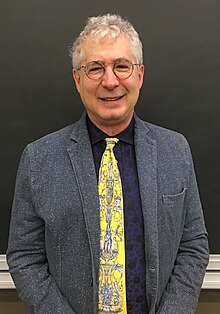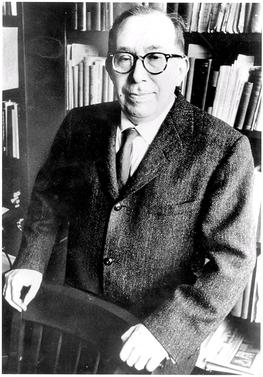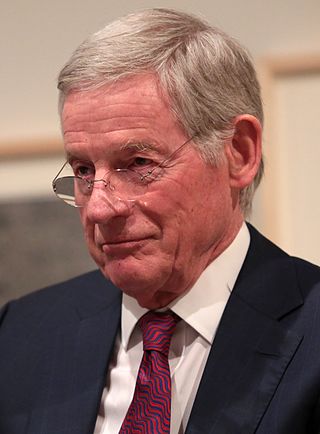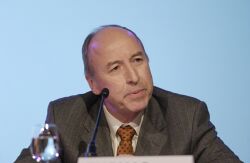
Clifford Orwin is a Canadian-American professor of ancient, modern, contemporary and Jewish political thought. He is also a prominent writer on contemporary politics and culture.

Clifford Orwin is a Canadian-American professor of ancient, modern, contemporary and Jewish political thought. He is also a prominent writer on contemporary politics and culture.
Orwin was born in 1947 in Chicago, Illinois, United States to a Jewish family. He earned B.A. in Modern History from Cornell University, where he studied political philosophy with Allan Bloom, and an M.A. and Ph.D. in Political Philosophy from Harvard University under Harvey Mansfield.
Orwin moved to Canada to take up a teaching position at the University of Toronto, and later became a Canadian citizen. He is currently a Professor of Political Philosophy, Classical Studies and Jewish Studies at the University of Toronto, where he has taught for many decades and where he currently serves as Chair of the Munk School of Global Affairs and Public Policy's program in Political Philosophy and International Affairs.
He is often identified as a Straussian [1] [2] [3] and is critical of theories that identify Leo Strauss with neoconservatism and the War in Iraq. [4] He supports the Democratic Party, but is critical of its left wing. [5]
He has held a Guggenheim Fellowship and an NEH Fellowship. He has been a Fellow at the Sheldon Chumir Foundation for Ethics in Leadership, and in 2003 he received the school's Outstanding Teaching Award. He is also a Distinguished Visiting Fellow at the Hoover Institution of Stanford University.
Multilingual, he can speak English and French and read Hebrew, Latin and Ancient Greek.
He has written and translated articles on Herodotus, Thucydides, Plato, Machiavelli, Montesquieu, Churchill, Charles Taylor, American religion, and humanitarian military intervention. His books are The Humanity of Thucydides (1994), and The Legacy of Rousseau (1997) edited with Nathan Tarcov.
He projects a book on the role of compassion in modern political thought and practice, and a study of the Book of Esther . He describes Rousseau as "the modern philosopher with whom I'm most familiar".
He is often asked to speak at student events. When debating Canada's role in Afghanistan at the University of Toronto's Hart House in 2006, he was interrupted by a small demonstration.
He writes both polemical and philosophical columns for The Globe and Mail and National Post . [6]
He is a director of Energy Probe Research Foundation, an anti-nuclear environmental organization based in Toronto. [7]
The Chair of the University of Toronto Political Science department has said of him: "If there is another observation to be made or argument to be explored or interpretation to be developed, Cliff wants to hear it." [8]
He has written of his teaching method: "My methods harken back to an older kind of warfare: 'Don't teach until you see the whites of their eyes.' Eye-to-eye teaching resembles hand-to-hand combat. Teacher and student struggle, and if they're lucky both lose -- each is compelled to learn from the other. It's not a relation of equals, and teachers who pretend that it is should find another calling, like talk show host. But neither is the role of the student passive."
A number of Orwin's students have become teachers and scholars themselves in a range of disciplines. These include: Norman Doidge, a psychiatrist with affiliations at the University of Toronto and Columbia Medical School; Janis Freedman Bellow (the widow of Nobel Laureate author Saul Bellow) who lectures in English at Tufts University; Robert Howse, a professor of international law and legal and political theorist at NYU Law School who also has a research affiliation with the University of Paris I (Pantheon-Sorbonne); Christina Tarnopolsky, a political science professor at McGill University who formerly taught in the Government Department at Harvard; and Nathan Busch, a political science professor at Christopher Newport University, and helped develop the Center for American Studies at Christopher Newport. His son, Alexander Orwin, is a professor of political science at Louisiana State University.

Niccolò di Bernardo dei Machiavelli was a Florentine diplomat, author, philosopher, and historian who lived during the Italian Renaissance. He is best known for his political treatise The Prince, written around 1513 but not published until 1532, five years after his death. He has often been called the father of modern political philosophy and political science.

Allan David Bloom was an American philosopher, classicist, and academician. He studied under David Grene, Leo Strauss, Richard McKeon, and Alexandre Kojève. He subsequently taught at Cornell University, the University of Toronto, Tel Aviv University, Yale University, the École normale supérieure, and the University of Chicago.
Modernity, a topic in the humanities and social sciences, is both a historical period and the ensemble of particular socio-cultural norms, attitudes and practices that arose in the wake of the Renaissance—in the Age of Reason of 17th-century thought and the 18th-century Enlightenment. Commentators variously consider the era of modernity to have ended by 1930, with World War II in 1945, or as late as the period falling between the 1980s and 1990s; the following era is often referred to as "postmodernity". The term "contemporary history" is also used to refer to the post-1945 timeframe, without assigning it to either the modern or postmodern era.

Leo Strauss was an American scholar of political philosophy. Born in Germany to Jewish parents, Strauss later emigrated from Germany to the United States. He spent much of his career as a professor of political science at the University of Chicago, where he taught several generations of students and published fifteen books.

Exegesis is a critical explanation or interpretation of a text. The term is traditionally applied to the interpretation of Biblical works. In modern usage, exegesis can involve critical interpretations of virtually any text, including not just religious texts but also philosophy, literature, or virtually any other genre of writing. The phrase Biblical exegesis can be used to distinguish studies of the Bible from other critical textual explanations.
Harry Victor Jaffa was an American political philosopher, historian, columnist, and professor. He was a professor emeritus at Claremont McKenna College, Claremont Graduate University, and was a distinguished fellow of the Claremont Institute. Robert P. Kraynak says his "life work was to develop an American application of Leo Strauss's revival of natural-right philosophy against the relativism and nihilism of our times".
Shadia B. Drury is a Canadian academic and political commentator. She is a professor emerita at the University of Regina. In 2005, she was elected a Fellow of the Royal Society of Canada.
The Claremont Review of Books (CRB) is a quarterly review of politics and statesmanship published by the conservative Claremont Institute. A typical issue consists of several book reviews and a selection of essays on topics of conservatism and political philosophy, history, and literature. Authors who are regularly featured in the Review are sometimes nicknamed "Claremonsters."

Harvey Claflin Mansfield Jr. is an American political philosopher. He was the William R. Kenan Jr. Professor of Government at Harvard University, where taught from 1962 until his retirement in 2023. He has held Guggenheim and NEH Fellowships and has been a Fellow at the National Humanities Center. In 2004, he was awarded the National Humanities Medal by President George W. Bush and delivered the Jefferson Lecture in 2007.

Thomas Lee Pangle, is an American political scientist. He holds the Joe R. Long Chair in Democratic Studies in the Department of Government and is Co-Director of the Thomas Jefferson Center for Core Texts and Ideas at the University of Texas at Austin. He has also taught at the University of Toronto and Yale University. He was a student of Leo Strauss.
Charles E. Butterworth is a philosopher of the Straussian school and currently an emeritus professor of political philosophy at the University of Maryland, College Park.
Anne Norton is an American political scientist. She is a Professor of Political Science at the University of Pennsylvania.
John Anthony Rohr was an American political scientist who was Professor Emeritus at the Center for Public Administration and Policy at Virginia Tech. Rohr is particularly known as a leading scholar of the U.S. Constitution in relationship to civil servants and public administration.
Stanley Rosen was Borden Parker Bowne Professor of Philosophy and professor emeritus at Boston University. His research and teaching focused on the fundamental questions of philosophy and on the most important figures of its history, from Plato to Heidegger.
Steven B. Smith is the Alfred Cowles Professor of Political Science at Yale University. From 1996 to 2011 he was the Master of Branford College at Yale.
Ernest L. Fortin, A.A. was a professor of theology at Boston College. While engaged in graduate studies in France, he met Allan Bloom, who introduced him to the work of Leo Strauss. Father Fortin worked at the intersection of Athens and Jerusalem.

Patrick Thomas Riley was Michael Oakeshott Professor of Political Science at the University of Wisconsin-Madison. He is notable for his translations of the political writings of Gottfried Leibniz and his research on social contract theory, the general will, and the history of universal jurisprudence.
Bradley C. S. Watson is a Canadian-born American political science educator, lawyer, and writer, and a member of the "West Coast Straussian" school of political thought.

Michael Peter Davis is an American philosopher and educator. He is a professor of philosophy at Sarah Lawrence College.
Werner Joseph Dannhauser was an American political philosophy professor and magazine editor. A German-Jewish émigré, he became an expert on the philosophy of Friedrich Nietzsche and on Judaism and politics and was a longtime professor of government at Cornell University. A protégé of Leo Strauss at the University of Chicago, Dannhauser had earlier been a writer and editor at Commentary magazine during the 1960s.